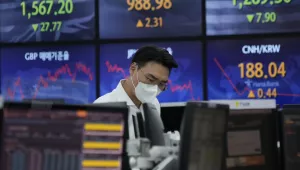The possibility of devaluation is apparently an issue in the upcoming Argentine elections. (The forward rate for next year is about 13 pesos per dollar, which is close to the informal rate and suggests a big devaluation relative to the current official exchange rate of 8.) In this connection, an Argentine newspaper has asked me about “Contractionary Currency Crashes,” a paper that I presented as the 5th Mundell-Fleming Lecture of the IMF’s Annual Research Conference.
1) Do you think the conclusions about the connections between devaluation and elections are still valid in 2015 even though your article was published in 2005?
My most relevant finding was that political leaders had historically been twice as likely to lose office in the six months following a big devaluation as otherwise. It is true that some things have changed over the last ten years. Medium-sized emerging market countries used to have pegs or targets as their exchange rate policies, with occasional forced devaluation. Since the turn of the century, the typical medium-sized emerging market country has switched to a managed float. Thus changes in the exchange rate are more commonplace. Nevertheless, I think most of the conclusions are still relevant in 2015.
2) What would you suggest to the presidents that are in campaign? That he/she should never promises that is not going to devalue? That this promise can be very costly?
Any politician in campaign mode is familiar with the general problem that declarations which are likely to help his or her chances of being elected may create constraints that he or she regrets later when facing the realities of governing. I am glad that I am not a politician. But in my study we found that presidents seldom make an explicit promise not to devalue; rather, when necessary, they delegate this dangerous task to their finance minister or central bank governor. Then the minister is the one who has to resign if the devaluation happens anyway.
3) What are the arguments to support the possibility that the “costs of a devaluation may be more political than economic”?
It is worth considering political aspects of devaluation that may hold even when devaluation has a beneficial effect on the economy. One political aspect is the finding that ministers are more likely to lose their jobs as a result of a devaluation if they had promised not to devalue. Another is the point that incumbent politicians often postpone a needed devaluation until after an election, so that they don’t have to take the blame. A third is the observation that sometimes new leaders decide it is smart to get the delayed devaluation out of the way soon after taking office.
My study found that, aside from these political phenomena, the big costs arose in those cases when a devaluation contributed to an economic recession. The most important reason why a devaluation sometimes causes an economic recession has to do with dollar debt: If the country has previously incurred a lot of dollar-denominated debt, the devaluation confronts a currency-mismatch and so devastates the balance sheets of banks and other companies who find that they can no longer service dollar debts because dollars are now so expensive. Fortunately during the years 2004-2008, many emerging market countries managed to switch the composition of their capital inflows away from dollar-denominated debt. Unfortunately corporations in many Emerging Market countries have recently gone back to borrowing in dollars, which means that they are once again vulnerable to a devaluation.
.
Frankel, Jeffrey. “Devaluations are Often Associated with Changes in Government.” April 16, 2015



